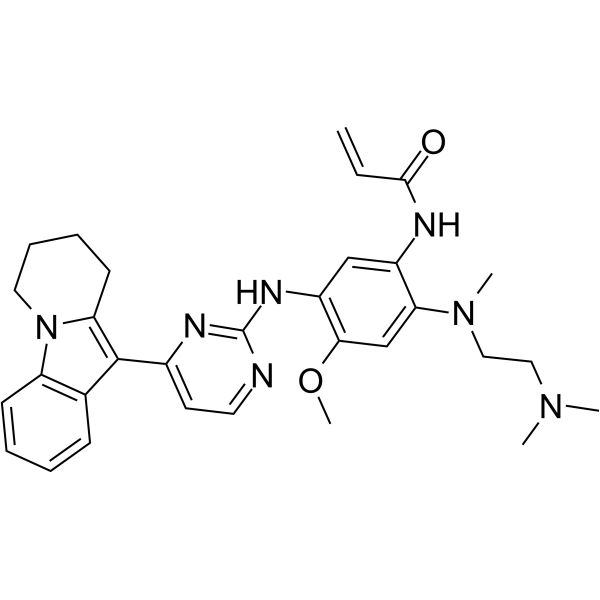Oritinib

Oritinib structure
|
Common Name | Oritinib | ||
|---|---|---|---|---|
| CAS Number | 2035089-28-0 | Molecular Weight | 539.67 | |
| Density | N/A | Boiling Point | N/A | |
| Molecular Formula | C31H37N7O2 | Melting Point | N/A | |
| MSDS | N/A | Flash Point | N/A | |
Use of OritinibOritinib (SH-1028), an irreversible third-generation EGFR TKI, overcomes T790M-mediated resistance in non-small cell lung cancer. Oritinib (SH-1028), a mutant-selective inhibitor of EGFR kinase activity, inhibits EGFRWT, EGFRL858R, EGFRL861Q, EGFRL858R/T790M, EGFRd746-750 and EGFRd746-750/T790M kinases, with IC50s of 18, 0.7, 4, 0.1, 1.4 and 0.89 nM, respectively[1]. |
| Name | Oritinib |
|---|
| Description | Oritinib (SH-1028), an irreversible third-generation EGFR TKI, overcomes T790M-mediated resistance in non-small cell lung cancer. Oritinib (SH-1028), a mutant-selective inhibitor of EGFR kinase activity, inhibits EGFRWT, EGFRL858R, EGFRL861Q, EGFRL858R/T790M, EGFRd746-750 and EGFRd746-750/T790M kinases, with IC50s of 18, 0.7, 4, 0.1, 1.4 and 0.89 nM, respectively[1]. |
|---|---|
| Related Catalog | |
| Target |
EGFR (WT):18 nM (IC50) EGFRL858R:0.7 nM (IC50) EGFRL861Q:4 nM (IC50) EGFRL858R/T790M:0.1 nM (IC50) EGFRd746-750:1.4 nM (IC50) EGFRd746-750/T790M:0.89 nM (IC50) |
| In Vitro | Oritinib (SH-1028) binds irreversibly to EGFR kinase by targeting cysteine-797 residue in the ATP binding site via covalent bond formation[1]. Oritinib (0.001-10 μM) potently and selectively targets mutant EGFR cell lines in vitro[1]. Oritinib (0.1 μM) continuously inhibits the phosphorylation of EGFR in PC-9 and NCI-H1975 cells at lower concentrations or even drug-free for at least 6 h[1]. Cell Proliferation Assay[1] Cell Line: A431 (EGFRWT), H3255 (EGFRL858R), PC-9 (EGFRd746-750) and NCI-H1975 (EGFRL858R/T790M) cells Concentration: 0.001, 0.01, 0.1, 1, and 10 μM Incubation Time: 72 hours Result: Selectively inhibited EGFR-mutated NCI-H1975, H3255 and PC-9 cells, with IC50s of 3.93±1.12, 9.39±0.88 and 7.63±0.18 nmol/L, respectively, which were about 198-, 83- and 102-fold more sensitive than the inhibition of wild-type EGFR in A431 cells (IC50=778.89±134.74 nM). |
| In Vivo | Oral administration of Oritinib at a daily dose of 5 mg/kg significantly inhibits proliferation of tumor cells with EGFR sensitive mutation (exon 19 del) and resistant mutation (T790 M) for consecutive 14 days, with no TKI-induced weight loss in mouse xenograft models[1]. Oritinib shows good bioavailability, and is distributed extensively from the plasma to the tissues[1]. Animal Model: 6-8 weeks old female mice bearing NCI-H1975 and A431 xenograft models [1] Dosage: 2.5, 5, and 15 mg/kg Administration: Orally administrated once daily for consecutive 14 days Result: Led to a significant inhibition of tumor cell growth in both PC-9 (exon 19 del) and NCI-H1975 (L858R/T790M) xenograft models. Animal Model: NCI-H1975 tumor-bearing mice[1] Dosage: 2.5, 5, and 15 mg/kg (Pharmacokinetic Analysis) Administration: Oral administration for 1 day or 14 consecutive days. Result: The Tmax is 1.5-2 h, indicating rapidly distributed into tissues, including lung tumor tissues. The AUC0–t values in plasma were 118, 300 and 931 ng×h/mL on Day 1, while 272, 308 and 993 ng×h/ml on Day 14, respectively. |
| References |
| Molecular Formula | C31H37N7O2 |
|---|---|
| Molecular Weight | 539.67 |